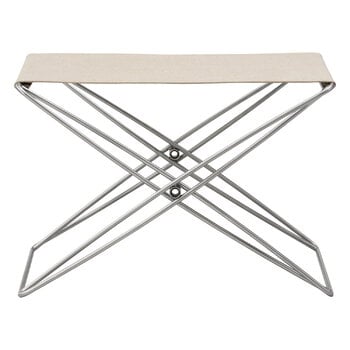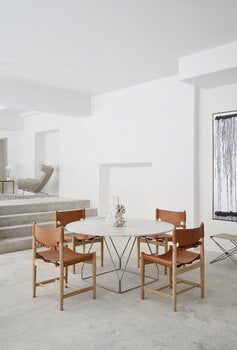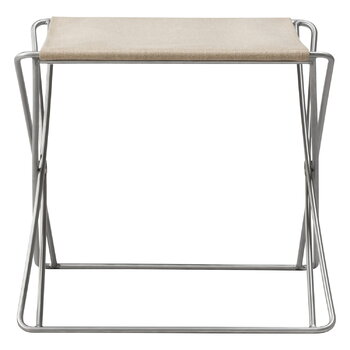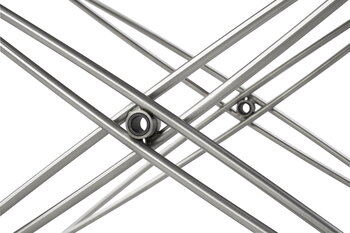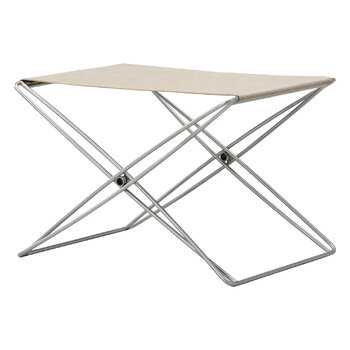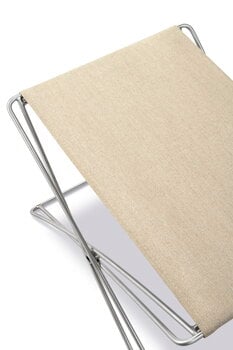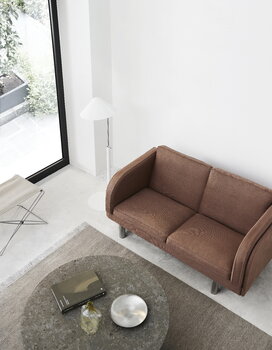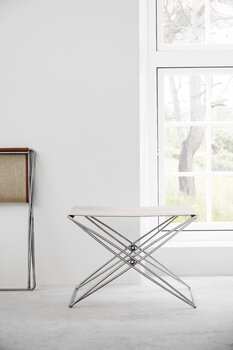Fredericia's JG stool is one of the most famous works of the Danish designer Jørgen Gammelgaard. The simple and graceful stool consists of a canvas seat and a rod base, which not only allows the chair to be folded up but also makes the design visually fascinating. The lightweight stool, designed in 1970, is perfect as an additional seat that you can conveniently move to wherever it is needed.
JG folding stool, brushed steel - natural canvas
Fredericia
Description
Fredericia's JG stool is one of the most famous works of the Danish designer Jørgen Gammelgaard. The simple and graceful stool consists of a canvas seat and a rod base, which not only allows the chair to be folded up but also makes the design visually fascinating. The lightweight stool, designed in 1970, is perfect as an additional seat that you can conveniently move to wherever it is needed.
Product details (9)
- Colour
- Natural linen, brushed steel
- Width
- 60 cm
- Depth
- 46 cm
- Height
- 40 cm
- Seat height
- 40 cm
- Frame material
- Stainless steel
- Upholstery fabric
- 100% linen canvas
- Weight
- 6.2 kg
- Warranty
- 7 years
- Product ID
Designer
Jørgen Gammelgaard (1938–1991) is a Danish designer who is best known for his Tip Top luminaire, launched in 1972 and nowadays part of Pandul's collection. He is especially renowned for his lighting fixtures and for his silverware designed for Georg Jensen, but by training Gammelgaard was in fact a carpenter and furniture designer. During his career, Gammelgaard also worked in the design offices of Arne Jacobsen and Mogens Koch, among others. From 1987, Jørgen Gammelgaard taught furniture design at the Royal Danish Academy of Arts.
View all productsReviews (0)
Sustainability
The Product Sustainability Framework, our criteria of sustainable design, helps you find the most sustainable products in our selection. Read below which sustainability criteria this product has met.
Working conditions & labour 7/9
-
Equal opportunities for all employees
-
Commitment to UN Global Compact, fair compensation for all employees
-
Corporate responsibility requirements defined and communicated for suppliers
-
Systematic work for improved inclusion and well-being in the workplace
-
Transparent supply chain
-
Suppliers' compliance to a code of conduct ensured
-
Support for community involvement in the supply chain
-
Direct suppliers audited and certified
-
Compliance to the UN Guiding Principles on Business and Human Rights ensured in the supply chain
Eco-friendly production 6/9
-
Fair and resource-wise water-use in production
-
No incineration or landfilling of returned items
-
No use of endangered species as materials
-
No direct environmental emissions or waste (excl. GHGs) from production
-
Material-efficient and ecological packaging
-
No potentially harmful chemicals used in own production
-
The sustainability of direct suppliers' production is addressed and monitored
-
Production and material sourcing that respect biodiversity, animal rights, and natural ecosystems
-
Positive impact on nature’s well-being through operations that regenerate natural ecosystems
Climate impact 5/8
-
Company's direct greenhouse gas emissions identified and commitment to reduction
-
Product's carbon impact identified and commitment to reduction
-
Guidance on energy- and eco-efficient use of the product
-
Contribution to climate initiatives beyond the brand’s direct operations
-
Carbon footprint of the product calculated and goals set to reduce it
-
Low-carbon or compensated transportation
-
100 % renewable energy in own production and operations
-
Carbon neutral or carbon negative product
Sustainable materials 5/6
-
Sustainable and long-lasting material choices
-
No harmful or hazardous substances
-
Responsible raw material sourcing and production
-
Materials suited for circularity: monomaterials, recyclable finishings, renewable or recycled contents etc.
-
Ecological materials: natural, biodegradable, recyclable or recycled contents
-
Outstanding materials in terms of innovativeness, responsibility, sustainability and circularity: local production or sourcing, 100 % recycled content, C2C-certification etc.
Circular design 4/5
-
High aesthetic quality promoting long-term use of the product
-
Technically durable product design and material choices
-
Design for enduring life-long quality
-
Design and support for product maintenance, repair and upgradability
-
Innovative circular design solutions: circular service system, resale platform, remanufacturing, collection of used products, etc.
